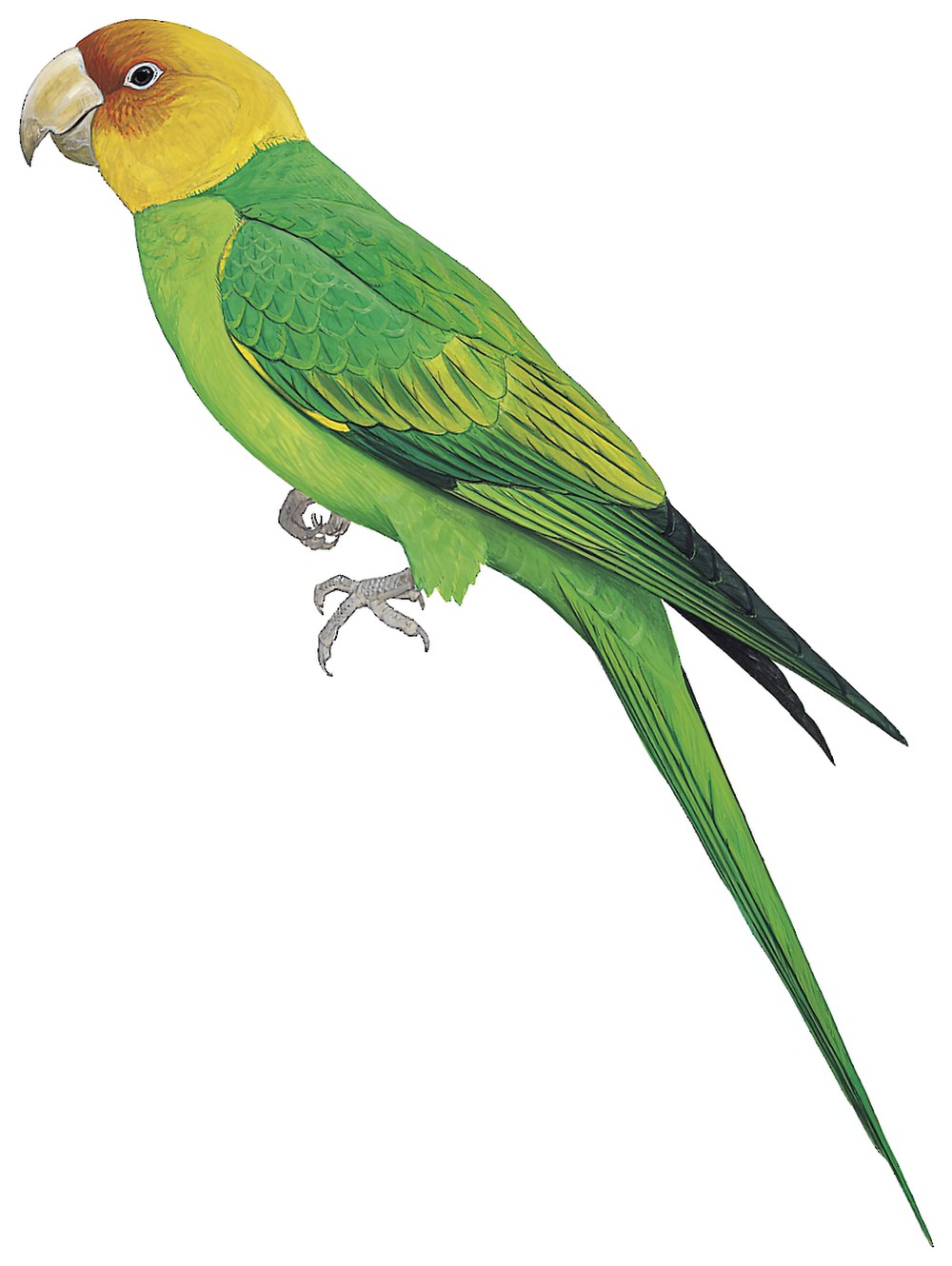Carolina Parakeet / Conuropsis carolinensis

Carolina Parakeet
SCI Name:
Protonym: Psittacus carolinensis Syst.Nat.ed.10 p.97
Taxonomy: Psittaciformes / Psittacidae / Conuropsis
Taxonomy Code: carpar
Type Locality: Carolina and Virginia.
Author: Linnaeus
Publish Year: 1758
IUCN Status: Extinct
DEFINITIONS
CONUROPSIS
‡ (Psittacidae; Ϯ Carolina Parakeet C. carolinensis) Genus Conurus Kuhl, 1820, parakeet; Gr. οψις opsis appearance; "[In Key] a4. Fourth primary attenuated, nostrils exposed; ambiens muscle always well developed (Garrod). 6. CONURUS. b4. Fourth primary not attenuated. a5. Cere feathered; nostrils hidden. ... a7. Bill of moderate size. a8. Upper mandible sharply notched. . . .7.CONUROPSIS. ... CONUROPSIS. Conuropsis, Salvad. MS. . .Type. C. carolinensis." (Salvadori 1891); "CONURUS Kuhl, 1820, becomes CONUROPSIS Salvadori, 1891. — The type of Conurus by the first species rule is C. guianensis, not C. carolinensis L. Therefore if we regard the Carolina Parakeet as generically different from the other species of Conurus, as is done by Salvadori in the British Museum Catalogue, XX, p. 203, we must adopt Conuropsis, the name he proposed for it." (Stone 1907); "Conuropsis Salvadori, Cat. Bds. Brit. Mus., 20, 1891, p. 146 (in key), p. 203. Type, by original designation and monotypy, Psittacus carolinensis Linné." (Peters, 1937, III, p. 192).
carolinense / carolinensis / caroliniana / carolinianus / carolinus
Carolina, the Carolinas or Carolina Colonies, North America. Ignoring the indigenous populations, this name was given by early European colonists to the vast swathe of North America between the Atlantic and the Mississippi, north of Spanish Florida and south of Virginia. Named after either Charles IX King of France (1550-1574; reigned 1560-1574) whose name was given in 1564 to the ill-fated Fort de la Caroline in French Florida, or after Charles I King of England (1600-1649; reigned 1625-1649) who granted a charter in 1629 to his attorney-general; the foundered charter was regranted in 1663 by Charles II King of England (1630-1685; reigned 1660-1685).
● ex “American Teal” of Pennant 1785, and Latham 1785 (Anas).
● ex “Goat Sucker of Carolina” of Catesby 1731, “Caprimulgus carolinensis” of Brisson 1760, “Engoulevent de la Caroline” of de Buffon 1770-1783, and “Short-winged Goatsucker” of Pennant 1785 (Antrostomus).
● "44. PSITTACUS. ... carolinensis. 8. P. macrourus viridis, capite collo genibusque luteis. Psittacus carolinensis. Catesb. car. I. p. 11. t. 11. Habitat in Carolina, Virginia." (Linnaeus 1758) (‡Conuropsis).
● ex “Figuier de la Caroline” of d’Aubenton 1765-1781, pl. 58, fig. 1, “Olive Warbler” of Pennant 1785, and “Yellow Poll” of Latham 1785 (syn. Dendroica aestiva).
● ex “Cat-Bird” of Catesby 1731 (Dumetella).
● ex “Mauvis de la Caroline” (= ♀) of d’Aubenton 1765-1781, pl. 556, fig. 2 (Euphagus).
● "54. PICUS. ... carolinus. 6. P. pileo nuchaque rubris, dorso fasciis nigris, rectricibus mediis albis nigro punctatis. Picus ventre rubro. Catesb. car. I. p. 19. t. 19. f. 2. Habitat in America septentrionali. Ani regio rubra punctata." (Linnaeus 1758) (Melanerpes).
● ex “Piscator” of Ray 1711, “Fishing Hawk” of Catesby 1731, “Falco piscator Antillarum et Carolinensis” of Brisson 1763 (ex “Pecheur” of Dutertre 1667-1671), and “Faucon pecheur de la Caroline” of de Buffon 1770-1783 (subsp. Pandion haliaetus).
● ex “Charles-town Pelican” of Latham 1785, and Pennant 1785 (subsp. Pelecanus occidentalis).
● ex “Torchepot de la Caroline” of Brisson 1760 (Sitta).
● ex “Great Wren of Carolina” of Bartram 1791 (syn. Thryothorus ludovicianus).
● ex “Gobe-mouche de la Caroline” of d’Aubenton 1765-1781, pl. 676 (syn. Tyrannus tyrannus).
● ex “Turtle of Carolina” of Catesby 1731 (subsp. Zenaida macroura).
UPPERCASE: current genus
Uppercase first letter: generic synonym
● and ● See: generic homonyms
lowercase: species and subspecies
●: early names, variants, mispellings
‡: extinct
†: type species
Gr.: ancient Greek
L.: Latin
<: derived from
syn: synonym of
/: separates historical and modern geographic names
ex: based on
TL: type locality
OD: original diagnosis (genus) or original description (species)












